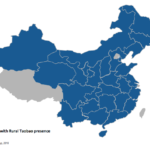Seniors in China: Bringing the elderly online, a smart business move
They are over 50 years old, living in urban zones and rural areas, some of them are retirees, and they go online: here come the “silver surfers.”Against all the odds, the elderly play an active role in the Internet boom and especially in the e-commerce one in China. However, Daxue Consulting’s team, which regularly conducts research on the Chinese elderly and their consumption behavior, found that the elderly market is not tapped into online despite the fact that it offers great opportunities.
The seniors in China, a growing age group willing to go online, offers a high-potential market
The seniors in China are already using the Internet, and more are likely to go online in the next years. Let’s take a quick glance at the figures that speak for themselves. According to a survey realized by the Canton Public Opinion Research Center, more than 32% of retirees nationwide go online frequently. This trend is upward given that the Chinese population is aging. In 2015, the elderly accounted for 13% of China’s population and will account for a quarter of the population by 2050 according to the infographic “How China will age” realized by Daxue Consulting in June 2016. From 2014 to 2015, the percentage of Internet users above 40 rose according to the 37th Statistical Report on Internet Development in China realized by CNNIC in January 2016, highlighting the fact that the Internet penetrates into the elderly age group. The elderly market estimated value in 2015 reaches RMB 4,000 billion, a figure that calls for greater focus on this market.
Looking beyond the figures, the elderly in China demonstrate a willingness to embrace the Internet. According to Zhang Kaiti, director of the China Research Center on Aging, the Internet meets the needs of older people who wish to feel relevant in the modern world. In fact, the elderly want to learn and experience new things, catch up with the pace of development in society, and connect with their children and friends.
For now, how do seniors in China concretely use the Internet?
The willingness to embrace the Internet previously mentioned is reflected by the increasing popularity of WeChat among the seniors in China. According to Tencent Company, there were 1.8 million users above 60 on WeChat in 2015. The social media application helps them to keep in touch with their family and friends more effectively than traditional methods, combining the functions of Facebook, WhatsApp, and Instagram. The Chinese elders also use more sophisticated services of WeChat, for example, the online payment service to pay for their utilities. WeChat’s popularity contributes to rocketing smartphones sales, which are expected to rise to around 688 million by 2019 according to statistics database website Statista.
According to a survey realized by the Canton Public Opinion Research Center, the top three reasons Chinese retirees gave for their Internet activities are acquiring knowledge and information, entertainment, and online shopping. A survey conducted by consultancy company Horizonkey finds that Internet users over 50 spend almost three hours a day online on average and that 25% of them regard the Internet as their primary source of information. Concerning online shopping, elderly Chinese consumers like shopping at online marketplaces such as Taobao.com and Dangdang.com. About 80% of respondents aged above 55 to a survey conducted by JDA Software and Centiro said they like shopping online, and 63% stated that they have bought online more than 10 times in 2015. Top spending categories for seniors are apparel, household items, digital products, skincare, and cell phone top-ups according to Taobao statistics. However, shopping online also brings some concerns. Many seniors are worried about fraud, counterfeits, and Internet security.
In practice, some Chinese elders face obstacles online. They have difficulties to use the Internet devices: a survey conducted by Wuhan University in 2015 reveals that a third of the seniors “frequently” encounter problems when using the Internet. There are also some usability issues: shopping via mobile phone is difficult for the seniors who can hardly read on smaller screens. “As seniors, we have to spend more money or time to accomplish what young people do just by tapping their fingers,” Li, aged 65, complained.
More businesses should invest in the elderly segment, currently undervalued
It appears that the most important thing is to teach the Chinese elders how to handle Internet device. Alibaba already invests in educating its customers of this age group by employing “Taobao rural partners”. Xiao Jiana is one of them: in Yang village, she is responsible for helping villagers buy goods of sell their farm produce on Taobao’s rural platform. She says that her job “is changing the lives of the elderly men and women” who are now aware that “there are vacuum cleaners and massagers, which are actually affordable” thanks to her. Taobao plans to have one partner in 300 rural villages within two years and has already established 65 rural village partners since the launch of this project in April 2015.
Applications and online platforms designed for the seniors in China slowly appear. An app called “Happy Mom and Dad” sends daily news bulletins to users featuring content that seniors might appreciate. In 2015, a mobile Internet platform called Laiye was launched to help to order cabs, food, housekeeping, air tickets, and hotels. The user sends requests by text or voice message, and Laiye staff does the technical stuff. Laiye aims to save users the time and stress and initially targets busy young professionals, but senior people are also clients. But the elderly market seems not to be valued as it should be according to Daxue’s team findings, as online shopping platforms such as JD.com, Amazon.cn, and Dangdang.com have no specific category for goods for the elderly on their main pages. Given the lack of commitment to senior consumers in China, much remains to be done to attract the Chinese elders online.
Case Study: Understanding Chinese seniors’ online behavior
At the request of a client, Daxue conducted a survey across China to provide them with insights about how the elderly perceive and use the Internet, and how they purchase online in China. Daxue organized and executed a poll in different Chinese provinces to identify current and future online consumption trends, and made recommendations on key development opportunities in the elderly market.
Source Picture: gbtimes.com








![[Podcast] China Paradigm 38: How to start a dream driven elderly care business in China](../wp-content/uploads/2019/05/China-podcast-Elderly-care-business-China-150x150.jpg)






